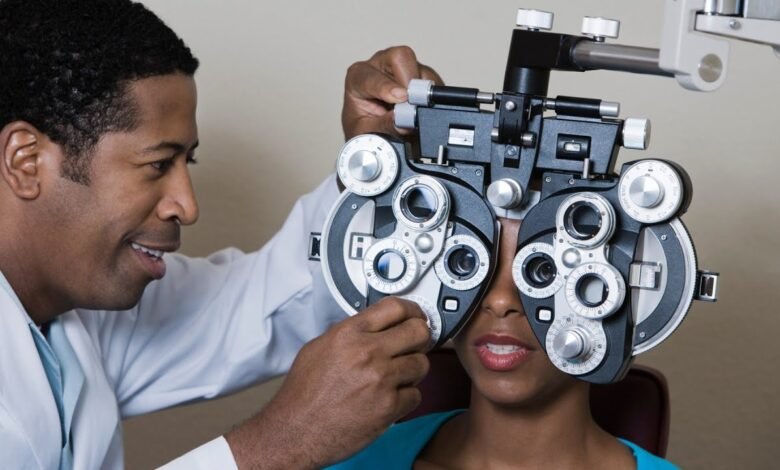The Role of Optometrists in Eye Care

Optometrists are healthcare professionals specializing in the diagnosis, treatment, and management of eye diseases and disorders. Their expertise lies in providing comprehensive eye care services, from routine eye exams to prescribing corrective lenses. Let’s delve into the world of optometry and explore the significant role these professionals play in safeguarding our vision health.
What is an Optometrist?
Optometrist in Fort Smith, Arkansas are primary healthcare providers trained to examine, diagnose, treat, and manage disorders of the visual system. They are not medical doctors but hold a Doctor of Optometry (OD) degree. Optometrists play a crucial role in promoting eye health and overall well-being by detecting and addressing vision problems early on.
Education and Training
Becoming an optometrist requires rigorous academic and clinical training. Prospective optometrists must complete a four-year undergraduate degree followed by a four-year Doctor of Optometry (OD) program. During their education, students learn about ocular anatomy, physiology, optics, pharmacology, and vision science. Clinical training involves hands-on experience in conducting eye examinations, diagnosing conditions, and managing patient care under supervision.
Scope of Practice
Optometrists are licensed to perform comprehensive eye exams to assess visual acuity, eye coordination, and overall eye health. They can prescribe and fit corrective lenses, including eyeglasses and contact lenses, to correct refractive errors such as nearsightedness, farsightedness, and astigmatism. Additionally, optometrists are trained to diagnose and manage various eye conditions, including glaucoma, cataracts, and diabetic retinopathy.
Specializations within Optometry
Optometrists may choose to specialize in specific areas of practice, such as pediatric optometry, focusing on children’s eye care, or geriatric optometry, addressing age-related vision issues. Sports vision specialists work with athletes to optimize visual performance and reduce the risk of sports-related eye injuries.
Technologies and Equipment
Advancements in technology have revolutionized the field of optometry, enabling optometrists to provide more accurate diagnoses and personalized treatment plans. From digital retinal imaging to corneal topography, optometrists have access to a wide array of diagnostic tools to assess ocular health. Moreover, cutting-edge equipment for contact lens fitting ensures optimal comfort and vision correction for patients.
Importance of Regular Eye Exams
Regular eye exams are essential for maintaining good vision and overall eye health. Optometrists recommend annual or biennial eye exams for individuals of all ages, even those with no apparent vision problems. These exams help detect refractive errors, eye diseases, and systemic conditions that may affect vision, allowing for early intervention and prevention of vision loss.
Career Opportunities
Optometrists have diverse career opportunities, ranging from private practice to corporate settings and beyond. Many optometrists choose to establish their private practices, providing personalized eye care services to their communities. Others may work in corporate settings, such as retail optical stores or healthcare organizations. Some optometrists pursue careers in research, academia, or public health, contributing to advancements in eye care and vision science.
Challenges in Optometry
Despite technological advancements, optometrists face challenges in meeting the evolving needs and expectations of patients. Keeping up with the latest diagnostic and treatment modalities requires ongoing education and training. Moreover, ensuring patient satisfaction while balancing clinical demands can be demanding.
Future Trends in Optometry
The future of optometry is shaped by emerging trends such as teleoptometry and the integration of artificial intelligence (AI) into diagnostic processes. Teleoptometry enables remote eye care services, expanding access to underserved communities and improving patient convenience. AI-powered diagnostic tools hold the promise of faster and more accurate detection of eye conditions, revolutionizing the way optometrists deliver care.
Conclusion
Optometrists play a pivotal role in preserving and enhancing vision health. Through comprehensive eye exams, personalized treatment plans, and ongoing patient education, these dedicated professionals ensure that individuals of all ages maintain optimal vision and overall well-being. As technology continues to advance, the field of optometry will evolve, offering new opportunities to improve patient care and outcomes.
FAQs
- How often should I have an eye exam?
- It is recommended to have a comprehensive eye exam at least once a year, or as advised by your optometrist.
- Can optometrists prescribe medication?
- In some states or countries, optometrists are authorized to prescribe certain medications for eye conditions, such as eye drops for infections or inflammation.
- At what age should children have their first eye exam?
- Children should have their first eye exam by the age of six months, followed by regular screenings throughout childhood.
- What is the difference between an optometrist and an ophthalmologist?
- While both optometrists and ophthalmologists are eye care professionals, ophthalmologists are medical doctors who can perform surgery and treat more complex eye conditions.
- How can I find a reputable optometrist near me?
- You can ask for recommendations from friends or family, check online reviews, or consult your primary care physician for referrals.



